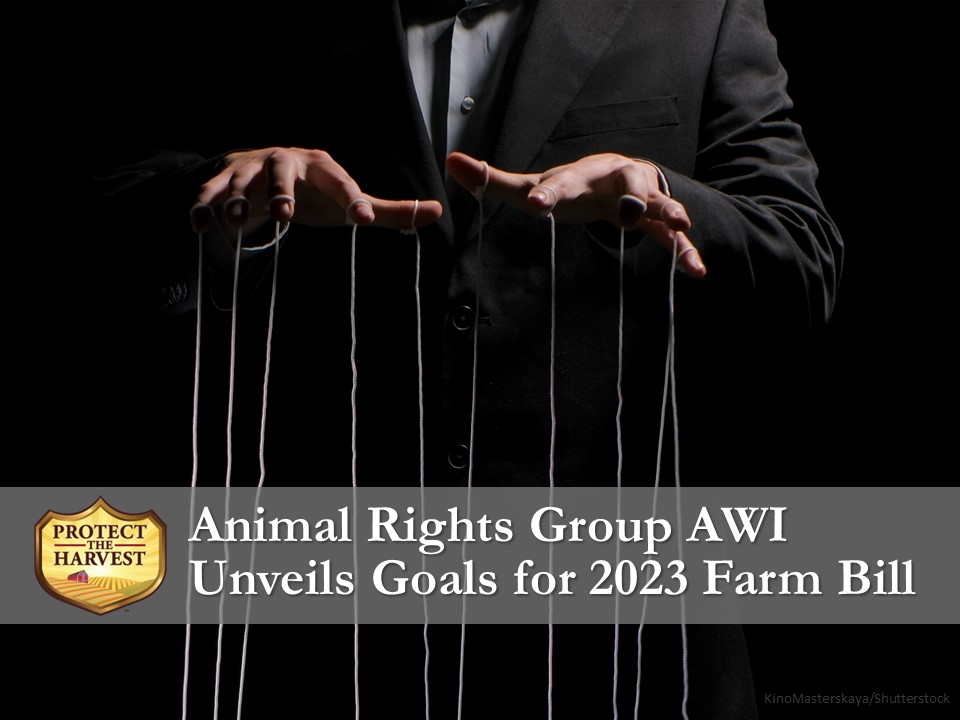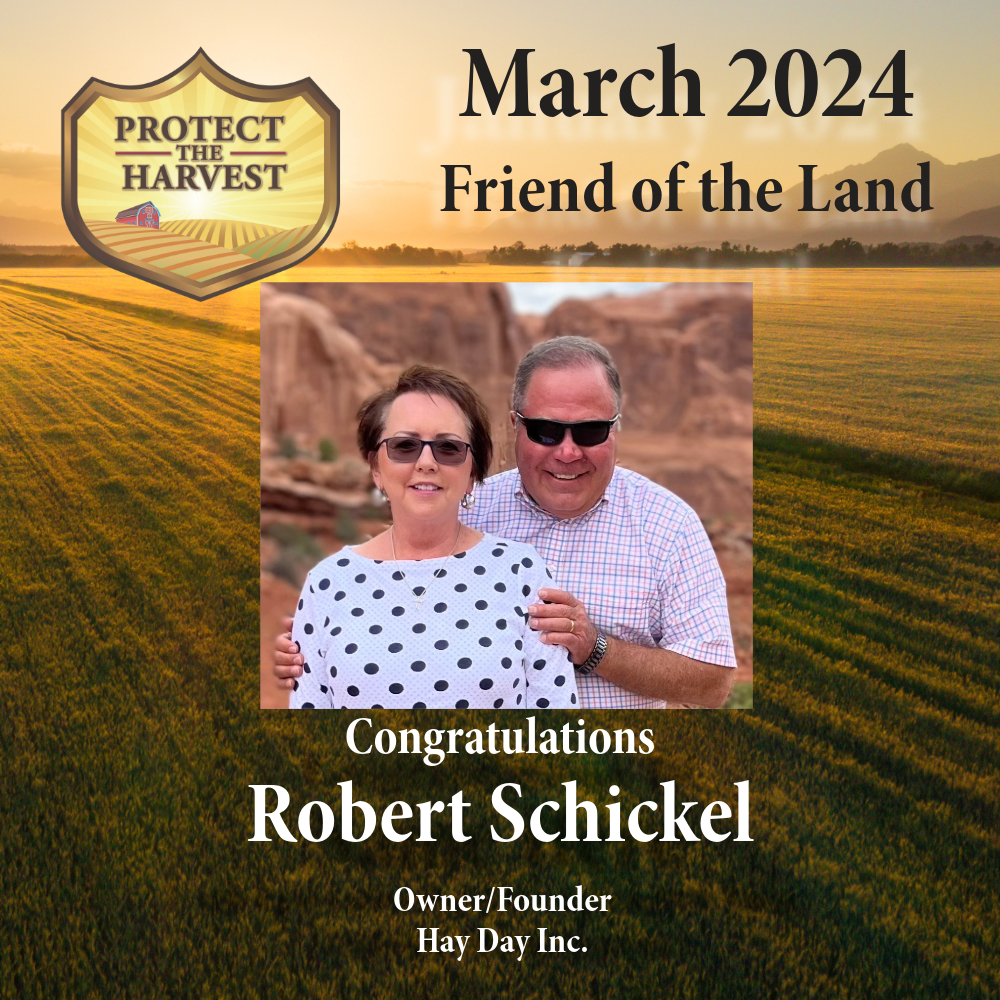The Animal Welfare Institute (AWI) recently released its desired list of goals for the upcoming 2023 Farm Bill. The extensive list covers a broad range of objectives from farm animals and wildlife to animal testing and aquariums.
AWI’s Deception
Contrary to its misleading name, AWI is more about promoting extremist animal rights ideology and beliefs through political lobbying and legislation than actual animal welfare.
AWI’s mission statement cites goals to “abolish factory farms,” “encourage the development and implementation of alternatives to experimentation on live animals” and “reform…brutal methods of capturing and killing wildlife.” Like many similar extremist groups, AWI is comprised of ardent supporters of “humane education” in the classrooms, choosing brainwashing over facts, science and truth.
Targeting Farm Animals
Of the twelve priorities AWI identifies as goals for its farm bill efforts, seven directly target animal farming and ranching, and meat processing.
Their first priority is titled “Protect Farmed Animals from Extreme Weather,” and calls for any recipients of USDA disaster assistance payments to have a proven disaster preparedness plan and provide a description as to how it was implemented to prevent farm animal injuries and deaths during extreme weather.
Essentially, this effort has been concocted to make it more difficult for farms and ranches to receive compensation for livestock and poultry death losses incurred during adverse weather conditions. AWI does not specify who will determine the appropriateness of the disaster preparedness plan, or its implementation. They simply want additional regulations and greater government control.
AWI’s second priority is labeled “Prohibit Inhumane Methods of Depopulation,” and refers to emergency euthanasia of poultry flocks exposed to highly pathogenic avian influenza (HPAI), which comes under the jurisdiction of USDA’s compensation program. AWI wants to have an audited plan in place for depopulation, although there is no reference as to what entity would conduct the audit.
The next desired AWI policy request focuses on animal transportation. Their interest is centered on “amending the Animal Health Protection Act to require establishment of fitness for transport criteria for animals transported domestically; and establishing enforcement mechanism(s) for the Twenty-Eight Hour Law that will allow the USDA to work with DOT officials to monitor compliance with this statute…”
To accomplish AWI’s desired outcome requires more regulations, including additional federal inspections by USDA’s Food Safety and Inspection Service (FSIS) at packing plants, live animal export inspections by USDA’s Animal and Plant Health Inspection Service (APHIS), and, finally, roadside inspections by the U.S. Department of Transportation’s (DOT) Federal Motor Carrier Safety Administration (FMCSA). It would be a gross understatement to consider this as anything other than wasteful federal government regulatory duplication and overkill.
To “Improve USDA Oversight of Poultry Slaughter,” AWI recommends more regulation and oversight with a policy request that will expand “the Humane Activities Tracking System (HATS) to include time spent by FSIS inspectors monitoring compliance with ‘“Good Commercial Practices’” (GCP) at poultry slaughter establishments.” They also propose amending the Poultry Products Inspection Act, requiring the Secretary of Agriculture to establish criteria for bird handling. Only animal rights activists who are ignorant about how many government inspectors are stationed at each large poultry processing plant could makes such demands.
Another AWI policy request of note is the call to “Incentivize Higher Welfare Farming Practices” which would “Provide (tax dollar) funding opportunities for livestock and poultry farmers to: upgrade facilities to meet higher welfare standards for production and obtain third-party animal welfare certification; transition away from intensive, confinement-based production to a pasture-based system; or transition out of livestock farming to specialty crop or organic commodity production. Funding opportunities may include tax credits, grant funding, or debt forgiveness for current producers.”
This is concerning, as it clearly targets large, established, modern farming operations and practices. AWI’s assumption is larger facilities have lower welfare standards as compared to smaller producers with non-confinement systems. AWI won’t talk about the increased risks from disease, predators, weather events or other factors that make large-scale, pasture-based, poultry production more challenging.
The last farm animal goal on AWI’s list pushes to “End the Public Health Threat on Mink Farms.” AWI wants a total ban on mink farming and reimbursement to current farmers for the full value of their operations. AWI has not offered to underwrite the cost of this proposal, so it is safe to presume they envision taxpayers footing the bill. Nor does AWI state what would become of the live minks. Perhaps they would be adopted by AWI members.
The thinly veiled excuse AWI uses to promote this agenda is based upon claims that mink are susceptible to COVID-19, avian influenza, and other viruses that might mutate in the animal. By manufacturing a “health crisis,” AWI is hoping to shut down an entire industry.
Consider this. If AWI’s effort successfully eradicates mink production, what is next? What would prevent AWI from moving to end other segments of animal agriculture?
AWI Wildlife Priorities
Regarding wildlife, AWI is taking aim at the use of chemical poisons currently approved for wildlife management. They want no further federal funding to be used for the placement, distribution, or deployment of these products. AWI would like to move toward “Non-lethal Methods Development.” They recommend allocating at least $5 million of Wildlife Services funds toward non-lethal tactics, yet AWI provides no specifics about what this would look like, or how it would be implemented.
Other AWI Priorities
An additional AWI priority of note includes a call to “Strengthen Enforcement of the Animal Welfare Act” (AWA) by means of the government’s licensing and confiscation provisions. This act includes animals used in commercial enterprises such as pet trade, exhibitions, entertainment, and research laboratories.
AWI claims “USDA has long failed to uphold the basic tenets of this law. Far too many animals have been, and continue to be, left to suffer and die at the hands of license holders who have been cited for repeated and egregious violations of the AWA.” Though AWI boldly makes this claim, they provide no specific examples or evidence.
Lastly, AWI is targeting zoos and aquariums. Their goal is to “Prohibit Certain
Cetaceans Breeding” by amending the aforementioned Animal Welfare Act, which would make it “unlawful for any person to breed or artificially inseminate any orca, beluga whale, false killer whale, or pilot whale for purposes of using the progeny of such species for public display.”
Stay Vigilant
The AWI has crafted an image based on being perceived as more “reasonable” compared to bigger, better-known, overtly aggressive extremist groups. Nevertheless, AWI’s goals and policies clearly align with other like-minded, animal rights, vegan agenda, extremist groups. AWI, like termites, seeks to take nibble away at animal ownership and use rights by taking small, well-measured, clearly defined steps toward a much larger goal to reduce, and eventually eliminate, animal agriculture and ownership through policy changes and laws.
Let’s work together to ensure “A Free and Fed America.” We can help you remain informed about current events and threats to animal agriculture in particular, and food production and food security in general. We urge you to remain vigilant and consider getting involved in local activities where you can make a difference. Find out how you can protect your freedom of choice to purchase and eat the food you want by visiting our website.




